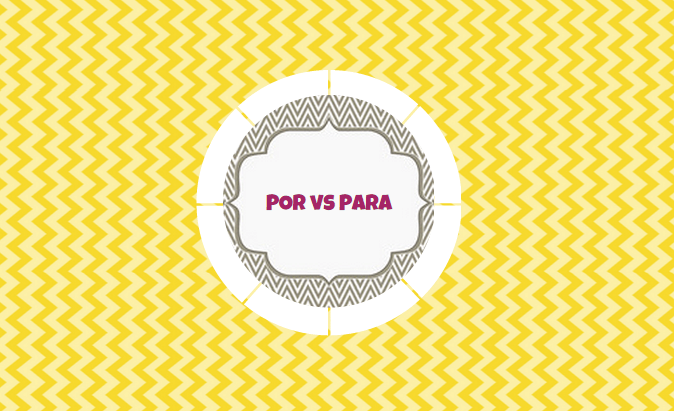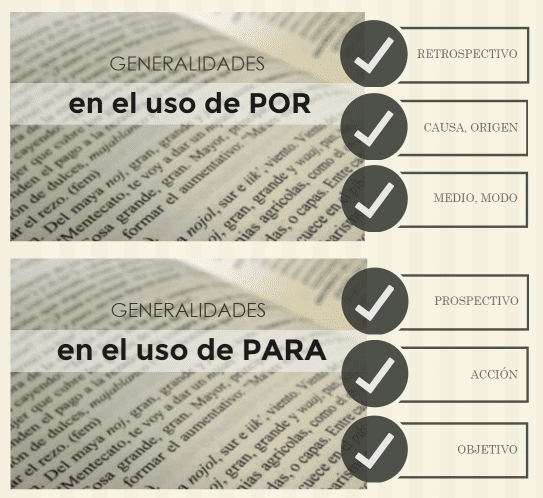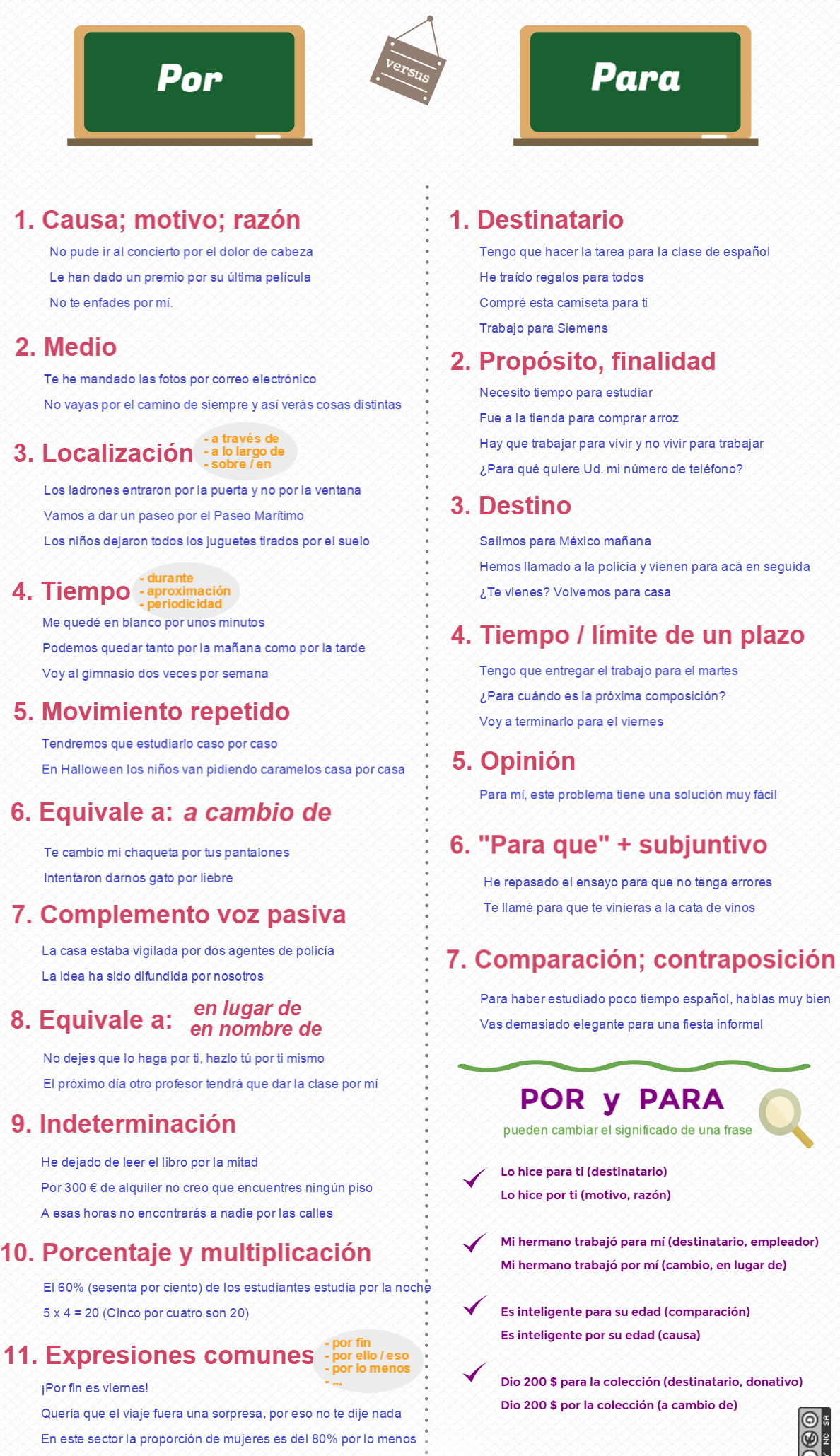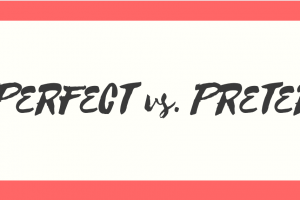Las preposiciones POR y PARA (por vs para)

Usos y expresiones con POR y PARA
Por y para son dos preposiciones que generan gran confusión al estudiante de español. Para poder utilizar con precisión las preposiciones por y para, es importante no reducirlas a una sola preposición. Esto ocurre en otros idiomas, como por ejemplo el inglés, que emplea generalmente for como equivalente de por y para. Recuerda que el aprendizaje y uso de las preposiciones es una de las mayores dificultades que toda lengua presenta, pues no siempre coinciden.
Para aprender a utilizar estas preposiciones (por vs para), es importante que sepas las funciones y usos que corresponden a cada una de ellas.
A modo de explicación general, te diremos que: por se refiere a la causa o razón de las cosas y para indica el propósito o destino de algo. Así, para tiene sentido de futuro o de objetivo mientras que por suele hacer referencia a algo retrospectivo o a la fuente/origen.

Esta oposición de prospectivo / retrospectivo puede ser un buen marco de referencia para llegar entender frases como:
– Lo hice para ti (I did it for you)
– Lo hice por ti (I did it because of you)
De todas formas, para un enfoque más práctico y exacto, deberás conocer los usos, funciones y expresiones idiomáticas más importantes de las preposiciones por y para (por vs para).

Finalmente te dejamos alguna práctica y expresiones idiomáticas. Recuerda que es muy importante practicar mucho, es la única forma de aprender un idioma.
Expresiones idiomáticas con POR:
– Por lo menos (at least):
Por lo menos no estoy solo. = At least I am not alone.
– Por los pelos (barely – lit. by the hairs):
Llegué a tiempo por los pelos. = I barely arrived on time.
– Por lo mismo (for that very reason):
Por lo mismo no te lo dije. = I did not tell you for that very reason.
– Por adelantado (in advance):
Tienes que pagar por adelantado. = You must pay in advance.
– Por lo tanto (therefore):
…por lo tanto la respuesta es no. = …therefore the answer is no.
– Por ahora (for now):
No tengo nada que decir por ahora. = I have nothing to say for now.
– Por lo visto (apparently):
Por lo visto, es enfermera. = Apparently, she is a nurse.
– Por lo que a mí me toca (as far as I am concerned):
Por lo que a mí me toca, el mayor problema es el idioma. = As far as I am concerned, the biggest problem is the language.
– Por ahí (around there):
Debe estar por ahí. = It should be around there.
– Palabra por palabra (word for word):
Tuve que repetirlo palabra por palabra. = I had to repeat it word for word.
– Por + adjetivo + que sea (however + adjective + it is):
Por sano que sea, no quiero comerlo. = However healthy it is, I don’t want to eat it.
– Por lo que he oído (judging by/according to what I have heard):
Por lo que he oído no es de España. = Judging by what I have heard she is not from Spain.
– ¡Por el amor de Dios! (For the love of God!)
– Por aquí (this way):
Podemos ir por aquí. = We can go this way.
– Por mi parte(for my part):
Por mi parte, prometo volver pronto. = For my part, I promise to come back soon.
– Por medio de (by means of):
Por medio de este artículo podrás aprender a usar por y para. = By means of this article you will learn how to use por and para.
– Por casualidad (by chance):
Lo encontré por casualidad. = I found it by chance.
– Por completo (completely):
Lo había olvidado por completo. = I had completely forgotten about it.
– Por cierto(by the way):
Por cierto, ¿tienes más café? = By the way, do you have more coffee?
– Por ciento (percent):
El treinta por ciento de la gente no votó. = Thirty percent of the people did not vote.
– Por motivo de (on account of):
No fuimos por motivo de la lluvia. = We did not go on account of the rain.
– Por ningún lado(nowhere/anywhere):
No lo encuentro por ningún lado. = I can’t find it anywhere.
– Por un lado / por una parte (on the one hand):
Por un lado, ya es muy tarde. = On the one hand, it is already too late.
– Por otro lado / por otra parte (on the other hand):
Por otro lado, está lloviendo. = On the other hand, it is raining.
– Por eso (that’s why, therefore):
Por eso no puedes ir a la fiesta. = That’s why you cannot go to the party.
– Por poco (almost):
Por poco me caigo. = I almost fell.
– Por desgracia (unfortunately):
Por desgracia, ya se ha ido. = Unfortunately he has already gone.
– Por ejemplo (for example):
Tienes varias opciones. Por ejemplo, puedes ir en coche. = You have different options. For example, you can go by car.
– Por supuesto (of course):
Por supuesto que te quiero. = Of course I love you.
– Por favor (please):
La cuenta, por favor. = The bill, please.
– Por suerte (fortunately):
Por suerte estabas allí. = Fortunately you were there.
– Por si acaso (just in case):
Lo compré por si acaso lo necesitabas. = I bought it just in case you needed it.
– Por las buenas o por las malas (whether you like it or not):
Irás al dentista por las buenas o por las malas. = You will go to the dentist whether you like it or not.
– Por separado (separately):
No se venden por separado. = They are not sold separately.
– Por escrito (in writing):
Lo necesito por escrito. = I need it in writing.
– Por primera / última vez (for the first / last time):
Te lo digo por última vez. = I am telling you this for the last time.
– Por todas partes / por todos lados (everywhere):
Los juguetes están por todas partes. = The toys are everywhere.
– Por lo demás (apart from that):
Luis, por lo demás, no tienes que hacer nada más. = Luis, apart from that you don’t have to do anything else.
– Por lo general (generally):
No como plátanos, por lo general. = I generally don’t eat bananas.
– Por último (finally – in a series of events or steps):
Por último, añade la leche. = Finally, add the milk.
– Por fin (finally – when you were expecting something):
¡Por fin ha llegado! = He has finally arrived!
Expresiones idiomáticas con PARA:
– Para siempre (forever):
Estaremos juntos para siempre. = We will be together forever.
– Para arriba (up, upward, upstairs):
Sube para arriba y espérame allí. = Go upstairs and wait for me there.
– Para abajo (down, downward, downstairs):
De cintura para abajo, el vestido es muy bonito. = The dress is very pretty from the waist down.
– Para delante (forward):
Ve para delante porque no puedo ver nada. = Move forward because I can’t see a thing.
– Para atrás (backwards):
¡Échate para atrás! = Back off!
– Para entonces (by that time):
Para entonces ya era muy famoso. = He was very famous by that time.
– Para variar (for a change):
Podrías decir la verdad para variar. = You could tell the truth for a change.
– Ser tal para cual (to be two of a kind):
Michael y Maite son tal para cual. Siempre están escuchando música. = Michael and Maite are two of a kind. They are always listening to music.
¡Esto es todo! Esperamos haberte ayudado con tus dudas entre POR y PARA.
Si tienes cualquier duda, o quieres profundizar con tu aprendizaje de español, recuerda que puedes contar con nosotras.
¡Hasta pronto!



